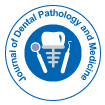当社グループは 3,000 以上の世界的なカンファレンスシリーズ 米国、ヨーロッパ、世界中で毎年イベントが開催されます。 1,000 のより科学的な学会からの支援を受けたアジア および 700 以上の オープン アクセスを発行ジャーナルには 50,000 人以上の著名人が掲載されており、科学者が編集委員として名高い
。オープンアクセスジャーナルはより多くの読者と引用を獲得
700 ジャーナル と 15,000,000 人の読者 各ジャーナルは 25,000 人以上の読者を獲得
インデックス付き
- Google スカラー
- ICMJE
役立つリンク
オープンアクセスジャーナル
このページをシェアする
抽象的な
Do parenting styles affect children?s oral health in Saudi Arabia?
Maram A Alagla
The purpose of the study is to correlate the parenting styles of parents with the oral health of their children, in Riyadh, Saudi Arabia.
Study design: Two hundred and eighty healthy preschool children, who have never been to the dentist, were recruited. Parenting style was determined by the Parenting Style and Dimensions Questionnaire (PSDQ). World Health Organization (WHO) criteria and simplified debris index (DI-S) were used for the diagnosis of dental caries and oral hygiene of the children respectively.
Two parenting styles were identified among Saudi parents; authoritative (94%, n = 265) and permissive (6%, n = 17). The majority of children were brushing by themselves (n = 130, 46.1%) and once per day (n = 163, 57.8%). Significant correlations were detected between parenting style and children’s brushing times (P-value of 0.016) and the number of meals consumed by children (P-value of 0.031). The age of the child and oral hygiene score were significantly correlated to dental caries (P-value < 0.05).
Two parenting styles were identified among Saudi parents. Parenting style influenced the child’s oral health but not significantly. Early childhood caries and fair to poor oral hygiene were commonly detected among children. Clinically interesting correlations were identified regarding factors affecting the child’s oral health status.

 English
English  Spanish
Spanish  Chinese
Chinese  Russian
Russian  German
German  French
French  Portuguese
Portuguese  Hindi
Hindi